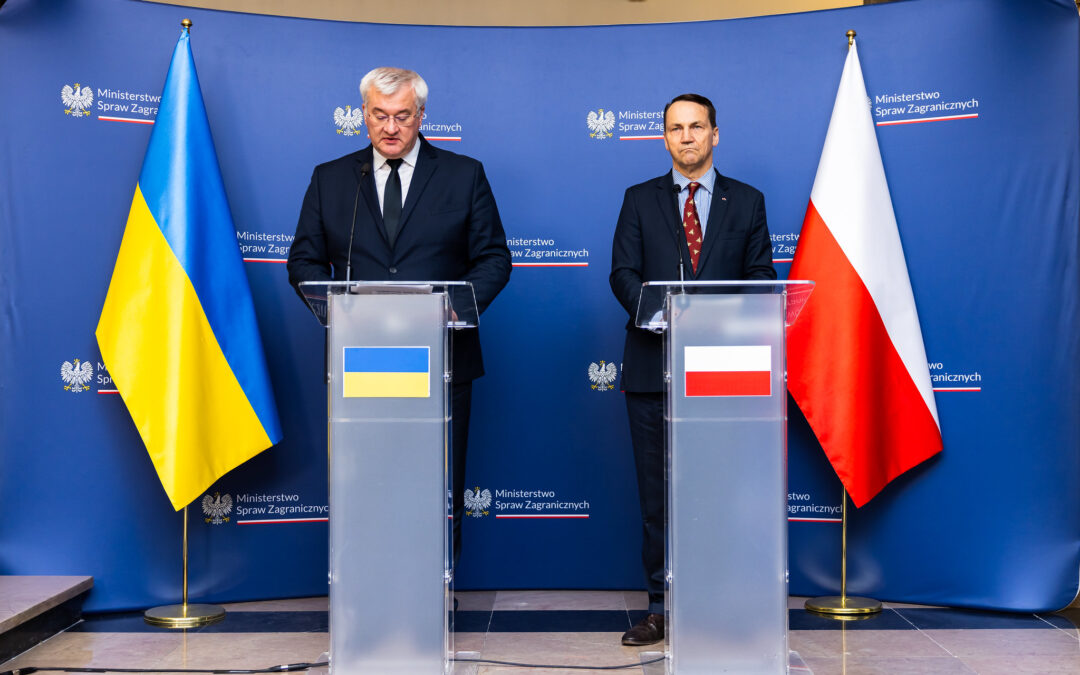Keep our news free from ads and paywalls by making a donation to support our work!

Notes from Poland is run by a small editorial team and is published by an independent, non-profit foundation that is funded through donations from our readers. We cannot do what we do without your support.
The foreign ministers of Poland and Ukraine have released a joint statement announcing progress towards resolving the thorny issue of exhuming the remains of ethnic Poles killed by Ukrainian nationalists during the Second World War.
Ukraine has indicated there are “no obstacles” to exhumations taking place and that it will “positively consider” requests for them to be conducted. However, both sides acknowledge that practical details are still being discussed.
The legacy of the Volhynia massacres – in which around 100,000 ethnic Polish civilians were killed – has long soured relations between the two otherwise close allies. Poland has even suggested it could block Ukraine’s accession to the European Union unless the issue is resolved.
💬 Ukraina potwierdza, że nie ma żadnych przeszkód do prowadzenia przez 🇵🇱 instytucje państwowe i podmioty prywatne, we współpracy z właściwymi instytucjami 🇺🇦, prac poszukiwawczych i ekshumacyjnych na terytorium Ukrainy.
| Min. @sikorskiradek podczas konferencji prasowej pic.twitter.com/eoi50AjnYM
— Ministerstwo Spraw Zagranicznych RP 🇵🇱 (@MSZ_RP) November 26, 2024
Today, Poland’s Radosław Sikorski and Ukraine’s Andrii Sybiha published a joint statement declaring their “determination to resolve the disputed issues concerning the common past in the name of universal human values and in the Christian spirit”.
“Ukraine confirms there are no obstacles to Polish state institutions and private entities – in cooperation with the relevant Ukrainian institutions and in accordance with Ukrainian legislation – carrying out search and exhumation works on Ukrainian territory,” wrote the two foreign ministers.
Kyiv also “declares its readiness to positively consider applications in these matters”, they added. The statement also condemned Russia’s aggression against Ukraine and expressed Poland’s ongoing support for Kyiv.
“This statement…is tangible proof of the close relations between our countries,” said Sikorski, quoted by news website Interia.
Speaking alongside him, Sybiha declared that “every family has the right to properly honour the memory of their ancestors and currently, as part of a joint working group, under the auspices of the culture ministries of both countries, we are working on practical mechanisms for conducting search and exhumation work”.
“We are on the right track, I believe that we are making progress,” added the Ukrainian minister.
The news was also cautiously welcomed by Polish Prime Minister Donald Tusk. “I hope that this time there will be no more obstacles,” he wrote on social media. “This is the key to the full reconciliation of our nations, so necessary at this dramatic moment in our common history.”
Ukraina nie będzie blokowała ekshumacji ofiar rzezi wołyńskiej. Nasi ministrowie przystępują do pracy nad konkretami. Mam nadzieję, że tym razem nie będzie już żadnych przeszkód. To klucz do pełnego pojednania naszych narodów, tak potrzebnego w tym dramatycznym momencie naszej…
— Donald Tusk (@donaldtusk) November 26, 2024
In 2022, Poland’s Institute of National Remembrance (IPN) estimated that the remains of around 55,000 ethnic Polish victims and 10,000 Jewish ones “still lie in death pits in Volhynia, waiting to be found, exhumed and buried”.
Recent years have seen a number of conciliatory remarks between Poland and Ukraine regarding the Volhynia massacres and the exhumation of victims. However, they have been followed by little concrete progress.
Last year, Poland’s then prime minister, Mateusz Morawiecki, said that Ukrainian President Volodymyr Zelensky had pledged that exhumations would take place. In October, Morawiecki’s government announced that a mass burial pit containing victims of the massacres had been found in Ukraine.
In an important symbolic moment, last year also saw Zelensky and his Polish counterpart, Andrzej Duda, jointly commemorate the 80th anniversary of the massacres. The speaker of Ukraine’s parliament, also “expressed sympathy” towards the victims and their families.
Poland will not allow Ukraine to join the EU until the issue of the Volhynia massacres in WWII is "resolved", says the Polish deputy PM
The massacres, in which Ukrainian nationalists killed ethnic Poles, have long caused tensions between the two countries https://t.co/cPEArLdvDL
— Notes from Poland 🇵🇱 (@notesfrompoland) July 24, 2024
However, in July this year, a deputy prime minister in Tusk’s new government warned that “Ukraine will not join the European Union if the Volhynia issue is not resolved”. In September, Sikorski said that Ukraine should allow exhumations “out of gratitude” for Poland’s support during the war with Russia.
Last month, the Ukrainian Institute of National Memory (UINM) announced that it was planning to search for the remains of victims in response to requests from Polish citizens.
The precise death toll of the massacres is unknown, but estimates range up to 120,000. The victims, the majority of whom were women and children, were, in many cases, killed with extreme brutality.
In Poland, the episode is widely regarded as a genocide, and has been recognised as such by parliament, but Ukraine rejects that description.

Notes from Poland is run by a small editorial team and published by an independent, non-profit foundation that is funded through donations from our readers. We cannot do what we do without your support.
Main image credit: MFA Poland/Flickr (under CC BY-NC 2.0)

Daniel Tilles is editor-in-chief of Notes from Poland. He has written on Polish affairs for a wide range of publications, including Foreign Policy, POLITICO Europe, EUobserver and Dziennik Gazeta Prawna.



















